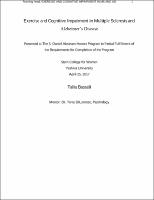Please use this identifier to cite or link to this item:
https://hdl.handle.net/20.500.12202/4233| Title: | Exercise and Cognitive Impairment in Multiple Sclerosis and Alzheimer’s Disease |
| Authors: | Bassali, Talia |
| Keywords: | Alzheimer's disease --Patients --Rehabilitation. Multiple sclerosis --Physical therapy. Exercise therapy. |
| Issue Date: | Apr-2017 |
| Publisher: | Stern College for Women |
| Abstract: | Cognitive impairment is a significant and life-altering consequence of both multiple sclerosis (MS) and Alzheimer’s disease (AD). Exercise is more commonly being explored as a mode of management and possibly improvement of cognitive impairment and memory loss in these diseases. Studies have shown significant correlation between fitness and degree of cognitive function in MS, and rate of cognitive decline in AD. Similarities between the aging population and those with MS and AD supports the notion that physical activity can help improve brain health and function, and slow down cognitive decline. A randomized controlled trial has yet to prove a positive effect of implemented exercise training on cognitive and brain function in MS. While few intervention studies have shown mildly positive results in AD, further research is needed in both fields to determine particular types of exercise that are most effective. The current research is in favor of a physically active lifestyle before the onset of old age to promote overall brain health and lesser cognitive impairment in both MS and AD. |
| Description: | The file is restricted for YU community access only. |
| URI: | https://hdl.handle.net/20.500.12202/4233 https://ezproxy.yu.edu/login?url=https://repository.yu.edu/handle/20.500.12202/4233 |
| Appears in Collections: | S. Daniel Abraham Honors Student Theses |
Files in This Item:
| File | Description | Size | Format | |
|---|---|---|---|---|
| Talia-Bassali.pdf Restricted Access | 205.1 kB | Adobe PDF |  View/Open |
This item is licensed under a Creative Commons License

